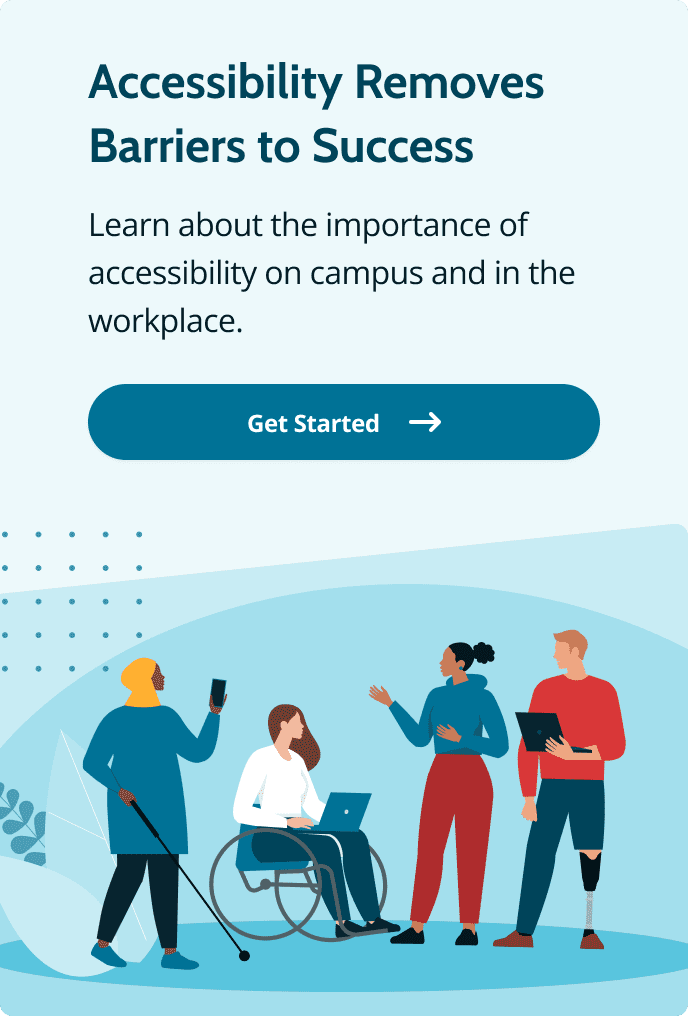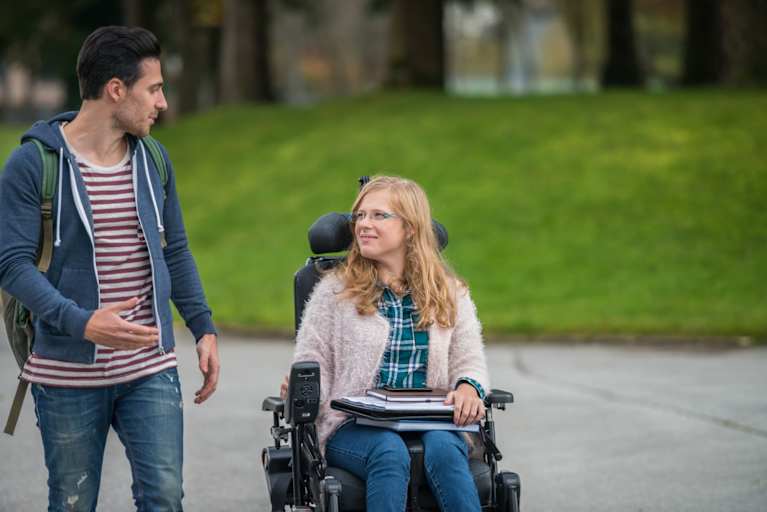Financial Aid for Students With Disabilities
A major obstacle that all students must overcome is the expense of obtaining a degree, a challenge that can be especially difficult for those with disabilities. Students with disabilities may face unique challenges or circumstances while pursuing a college education.
Fortunately, there is financial aid for students with physical disabilities, cognitive and learning disabilities, or neurological disabilities. You may need proof of disability from a medical professional, the Social Security Administration, or the Department of Veterans Affairs to qualify.
Read on to learn more about federal and state student aid options and specialized scholarships for students with disabilities.
Federal Financial Aid for Students With Disabilities
One option that helps students with disabilities pay for college is federal financial aid, including the Pell Grant. All students must complete the Free Application for Federal Student Aid (FAFSA) to receive federal financial assistance.
Pell Grants are income-based awards that do not need to be repaid, open for undergraduates with exceptional financial needs. The exact award amount you receive depends on your enrollment status, expected family contribution, and cost of attendance.
Pell Grants do not affect Social Security Disability Insurance (SSDI) or Supplemental Security Income (SSI) eligibility as they are not considered income, resources, or assets.
The FAFSA deadline is on June 30 of the school year for which you need aid. However, some states award financial aid on a first-come, first-serve basis, so it is important to complete your FAFSA as early as you can.
Social Security Disability Insurance
Social Security Disability Insurance (SSDI) provides monthly benefits to disabled individuals and their eligible family members based on their work history and payment of Social Security taxes. The benefit amount is determined by the length of employment and the earnings during that period.
SSDI itself does not pay for you to go to college; however, if you receive benefits, you may be eligible for Vocational Rehabilitation benefits, which can pay for postsecondary education, on-the-job training, assistive technology, and career counseling.
Supplemental Security Income (SSI)
Supplemental Security Income (SSI) provides essential financial aid to the elderly and those with disabilities. To qualify for SSI, you must be over the age of 65 or have a disability or blindness (with no age limit). You must also possess limited income and resources to sustain yourself.
Many states provide additional support on top of federal benefits, including food assistance, healthcare services, and supplemental income payments. While students can work and receive SSI, the program does have limitations on earned income.
Scholarships for Students With Disabilities
We compiled a list of just a few of the many specialized scholarships for students with disabilities. These awards can reduce the cost of earning a degree by thousands of dollars, and you do not have to repay them.
Graeme Clark Scholarship
Award amount: $2,000 a year for up to four years
Graduated high school seniors and undergraduate or graduate students who have a Cochlear Nucleus Implant and have a GPA of 3.0 or higher are eligible for this scholarship.
Scholarship applications open around March 31 every year and must be submitted by Sept. 30.
Ruby’s Rainbow College Scholarship
Award amount: $1,000-$10,000
Individuals with Down syndrome who are at least 18 years old with the desire and intent to enroll (or continue to enroll) in post secondary education are eligible to apply for this grant. Awards can be used towards tuition and any expenses included under the tuition fee.
Applications open on January 1, 2025, and are due in mid-April.
Jared Monroe Foundation Scholarship
Award amount: $500-$2,300
This scholarship is open to undergraduate and graduate students who are diagnosed with bipolar disorder and have a cumulative GPA of 3.0 or higher. Awards can be used towards tuition, fees, books, and room and board.
Applications are typically due on May 1 of every year.
180 Medical Scholarship Program
Award amount: $1,000
This scholarship is open to full-time college students who have spinal cord injuries, spina bifida, transverse myelitis, a neurogenic bladder, or an ostomy.
The program awards seven, $1,000 college scholarships annually. Applications are open from January 1 to June 1 each year.
Microsoft Disability Scholarship
Award amount: $10,000
High school seniors with disabilities aiming to study engineering, computer science, computer information systems, law, business, or related fields in college or university are eligible for this award.
Applicants must also have a cumulative GPA of 2.5 or higher and have a demonstrated financial need. The company awards up to 10 scholarships annually, which are renewable for up to three years or until you earn your bachelor’s degree.
Applications are due in March.

Frequently Asked Questions About Financial Aid for Students With Disabilities
Individuals who receive disability, or SSDI, can qualify for federal student aid. You must fill out the Free Application for Federal Student Aid (FAFSA) to figure out how much funding you are eligible for.
Note: The insights on this page — excluding school descriptions — were reviewed by an independent third party compensated for their time by BestColleges. Page last reviewed June 25, 2024.


